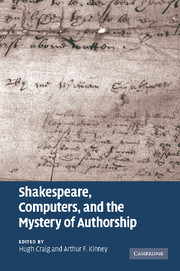Crossref Citations
This Book has been
cited by the following publications. This list is generated based on data provided by Crossref.
2010.
LIST OF BOOKS RECEIVED AS OF 1 MAY 2010.
Theatre Survey,
Vol. 51,
Issue. 2,
p.
339.
2010.
Books of Critical Interest.
Critical Inquiry,
Vol. 36,
Issue. 3,
p.
619.
2010.
Books Received.
Theatre Research International,
Vol. 35,
Issue. 2,
p.
215.
Hirsch, Brett D.
2011.
The Kingdom has been Digitized: Electronic Editions of Renaissance Drama and the Long Shadows of Shakespeare and Print.
Literature Compass,
Vol. 8,
Issue. 9,
p.
568.
2011.
LIST OF BOOKS RECEIVED AS OF 1 NOVEMBER 2010.
Theatre Survey,
Vol. 52,
Issue. 1,
p.
213.
Tudeau-Clayton, Margaret
2012.
Shakespeare Survey.
p.
239.
Burrows, John
and
Craig, Hugh
2012.
Authors and Characters.
English Studies,
Vol. 93,
Issue. 3,
p.
292.
Savoy, Jacques
2012.
Authorship Attribution: A Comparative Study of Three Text Corpora and Three Languages.
Journal of Quantitative Linguistics,
Vol. 19,
Issue. 2,
p.
132.
Hoover, David L.
2012.
The Tutor's Story: A Case Study of Mixed Authorship.
English Studies,
Vol. 93,
Issue. 3,
p.
324.
Hoenselaars, Ton
2012.
The Cambridge Companion to Shakespeare and Contemporary Dramatists.
2012.
The Life of William Shakespeare.
p.
443.
Kirwan, Peter
2012.
Canonising the Shakespeare Apocrypha: Shakespeare, Middleton and Co‐Existent Canons.
Literature Compass,
Vol. 9,
Issue. 8,
p.
538.
Marsden, John
Budden, David
Craig, Hugh
Moscato, Pablo
and
Altmann, Eduardo G.
2013.
Language Individuation and Marker Words: Shakespeare and His Maxwell's Demon.
PLoS ONE,
Vol. 8,
Issue. 6,
p.
e66813.
2013.
Shakespeare beyond Doubt.
p.
249.
Carson, Christie
and
Kirwan, Peter
2014.
Shakespeare and the Digital World.
p.
238.
Bourus, Terri
2014.
Young Shakespeare’s Young Hamlet.
p.
1.
2014.
Shakespeare and the Digital World.
p.
187.
Bourus, Terri
2014.
Young Shakespeare’s Young Hamlet.
p.
11.
Jowett, John
2014.
Disintegration, 1924.
Shakespeare,
Vol. 10,
Issue. 2,
p.
171.
2014.
Shakespeare's Stage Traffic.
p.
165.





